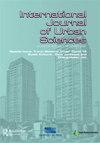Factors influencing fatal vehicle-involved crash consequence metrics at spatio-temporal hotspots in South Korea: application of GIS and machine learning techniques
IF 3
3区 工程技术
Q2 ENVIRONMENTAL STUDIES
引用次数: 4
Abstract
ABSTRACT Studies have employed several techniques to identify the effect of individual risk factors influencing crashes at hotspot locations. Nevertheless, as crashes are sometimes influenced by a combination of risk factors, identifying the chains of factors collectively contributing to fatal crashes at hotspot locations could provide added insights for improving traffic safety. By employing fatal crash data from Korea, this study identifies hotspots with increasing (critical) and decreasing (diminishing) temporal trends using a spatio-temporal hotspot analysis tool in GIS. Further, a machine learning technique is employed to explore the chains of factors influencing the number of vehicles and the number of casualties involved in fatal crashes at intersections and midblocks in each hotspot type identified. In general, results showed that minibuses/vans and construction vehicles were mainly at fault for fatal single-vehicle pedestrian-involved crashes. While many casualties and vehicles are likely to be involved in crashes at midblocks during the daytime regardless of the hotspot type, the nighttime variable was particularly associated with large casualty-size crashes at critical intersection hotspots. Further, while reckless driving was mostly associated with single-vehicle crashes at intersections in diminishing hotspots, pedestrian protection, and improper centreline crossing violations were more pronounced at midblocks in diminishing hotspots. This analysis identified groups of factors that could be collectively controlled to improve road safety and proposed countermeasures to mitigate fatal crashes on roadways.影响韩国时空热点地区致命车祸后果指标的因素:GIS和机器学习技术的应用
研究采用了几种技术来确定个体风险因素对热点地区交通事故的影响。然而,由于事故有时受到多种风险因素的综合影响,确定共同导致热点地区致命事故的因素链可以为改善交通安全提供更多的见解。通过使用来自韩国的致命事故数据,本研究使用GIS中的时空热点分析工具确定了具有增加(临界)和减少(递减)时间趋势的热点。此外,采用机器学习技术,探索在确定的每个热点类型中,影响十字路口和中间街区致命碰撞的车辆数量和伤亡人数的因素链。总体而言,结果显示小巴/货车和施工车辆是造成行人伤亡的单车交通事故的主要肇事者。尽管无论热点类型如何,许多人员伤亡和车辆都可能在白天发生在中间街区的撞车事故中,但夜间的变量与关键路口热点发生的大规模伤亡事故尤其相关。此外,尽管在热点逐渐减少的十字路口,鲁莽驾驶主要与单车碰撞有关,但在热点逐渐减少的中间街区,行人保护和不当的中线交叉违规行为更为明显。该分析确定了可以共同控制的因素组,以改善道路安全,并提出了减少道路致命碰撞的对策。
本文章由计算机程序翻译,如有差异,请以英文原文为准。
求助全文
约1分钟内获得全文
求助全文

 求助内容:
求助内容: 应助结果提醒方式:
应助结果提醒方式:


